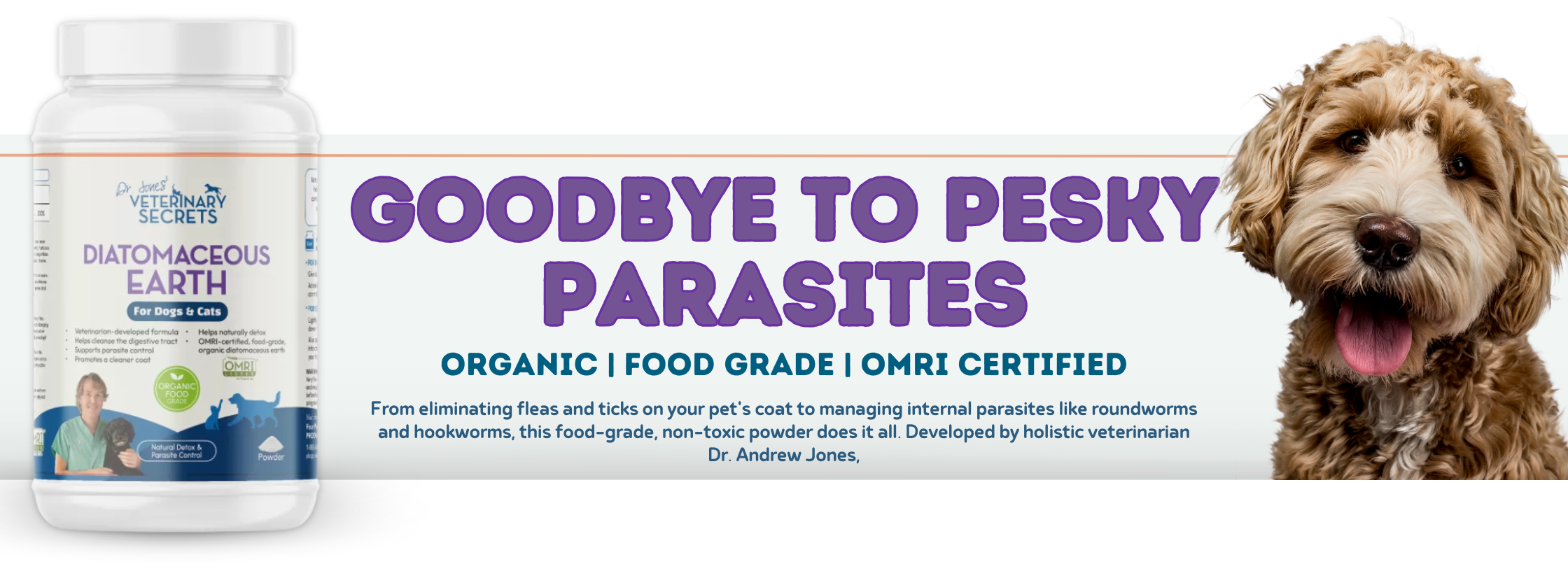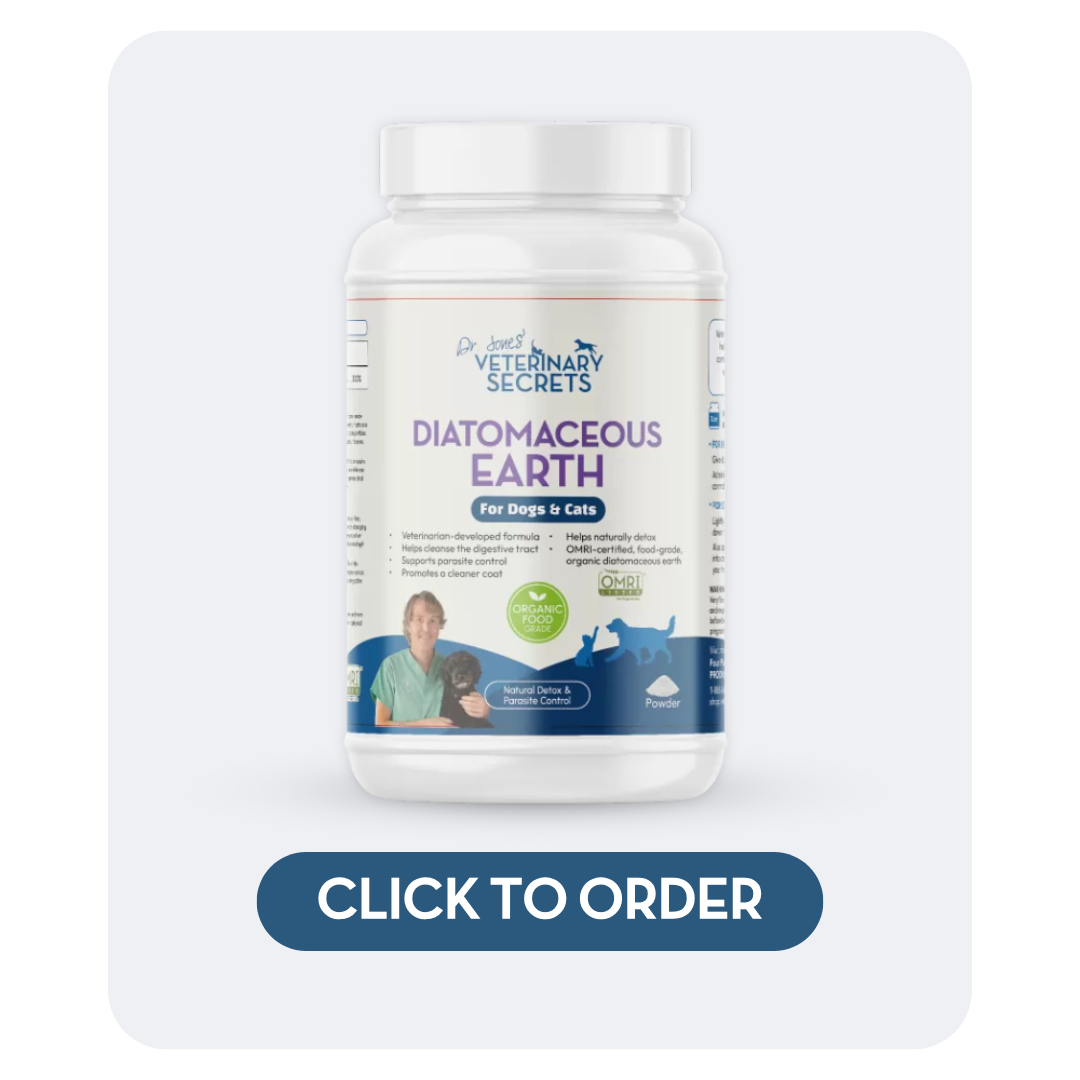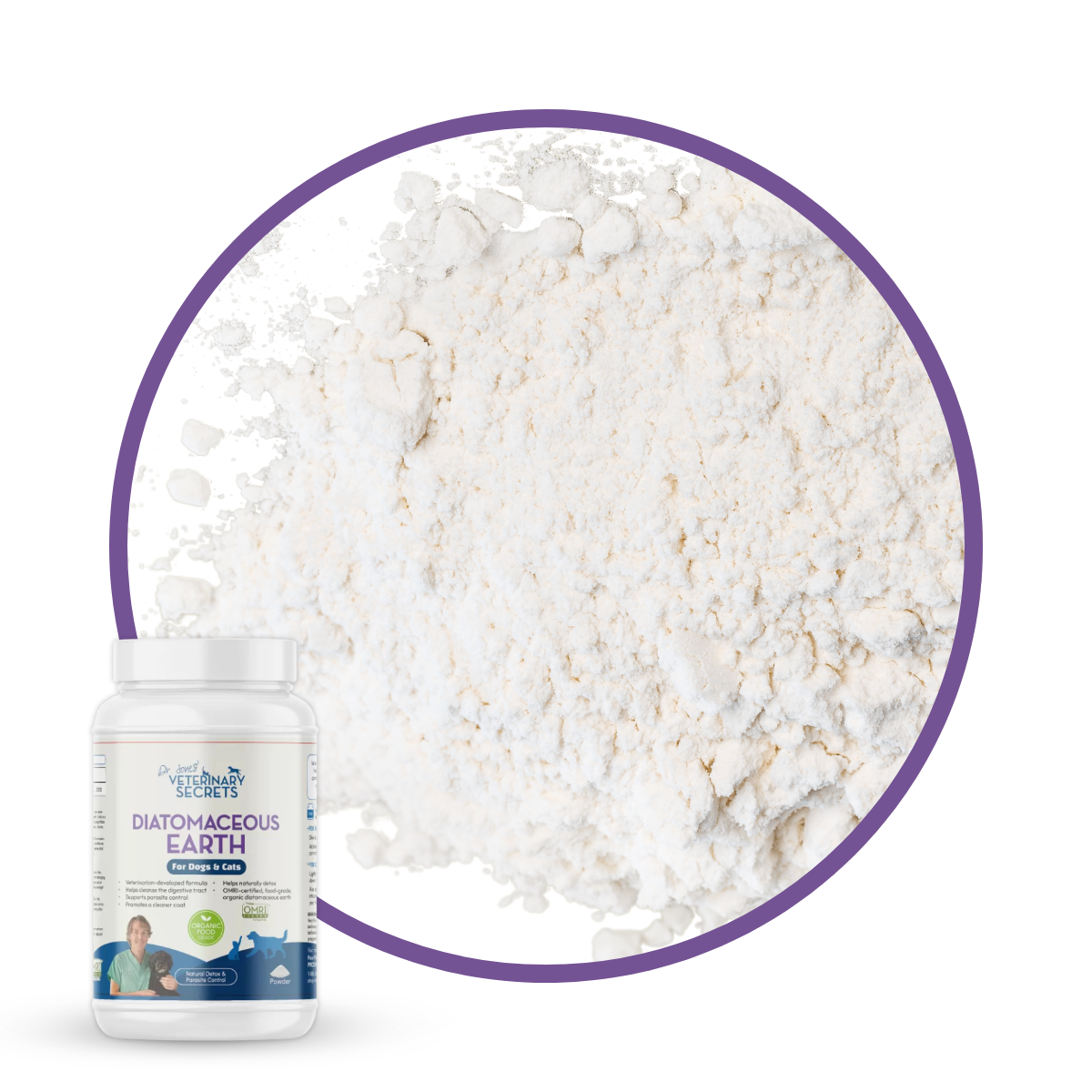How to Safely Treat Worms in Your Pets with Natural Remedies
![]()

Wondering About Worms in your Dogs and Cats?
If you’re dealing with worms or other pesky parasites in your pets, you’re probably looking for an effective and natural solution. One of the easiest and most reliable ways to manage parasites is with Diatomaceous Earth (DE)—a safe, natural, and highly effective remedy.
And now, I’m excited to share with you Dr. Jones’ Diatomaceous Earth Powder for Pets, an organic, certified product that’s not only incredibly effective but also budget-friendly.
Dr. Jones’ Diatomaceous Earth Powder for Pets
Diatomaceous Earth (DE) is a natural, food-grade powder made from fossilized algae. Its sharp microscopic edges are harmless to pets but lethal to parasites like roundworms, tapeworms, fleas, and ticks. Certified organic and chemical-free, DE offers a safe, non-toxic alternative to traditional dewormers and insecticides. It works both internally, by dehydrating internal parasites, and externally, by absorbing fats from pests’ exoskeletons. With multiple uses and great value, DE is a trusted, eco-friendly solution to help keep your pets and home parasite-free.


Wondering About Worms? Natural Options and Solutions for Your Pets
Worms and parasites in pets are more common than you might think, and they can lead to some serious health issues if not addressed. From roundworms to tapeworms, the range of internal parasites can cause everything from vomiting and diarrhea to weight loss. So, how do you know if your dog or cat has worms, and what can you do about it? Let’s dive into some natural solutions and other options to keep your pets healthy and worm-free.
Signs Your Pet May Have Worms
It’s not always easy to spot worms in your pet, but there are a few signs to watch out for:
-
White squiggly worms in the stool.
-
Grains of rice around your cat’s bum, which could indicate tapeworms.
-
Vomiting or diarrhea.
-
Weight loss, even with a good appetite.
Common Causes of Worms in Dogs and Cats
Worms are a common problem in pets, with up to one-third of dogs being infected with intestinal parasites like roundworms, tapeworms, coccidia, and giardia. Let’s look at the most common types and how to recognize them:

-
Roundworms (Toxocara canis): These are typically 1-3 inches long, white, and tapered. Puppies often get roundworms, and it’s common to see a bloated belly in infected dogs. They’re transmitted via worm eggs in the stool and on the ground.
-
Tapeworms (Dipylidium canis): Dogs with tapeworms may not show signs unless the infestation is heavy. A common sign is finding flat, white segments in your dog’s stool that resemble grains of rice. These worms are often acquired after your dog ingests a flea or a mouse.
-
Coccidia: A microscopic parasite that causes diarrhea, especially in puppies or dogs with weakened immune systems. Coccidia are spread through feces, contaminating the environment. Puppies in overcrowded, unsanitary conditions are most at risk.
-
Giardia: This waterborne parasite can cause diarrhea, often with blood or mucus in the stool. It’s spread through contaminated water and can be tough to diagnose, so many vets treat it with medication.
How to Prevent and Treat Worms in Pets
Hygiene & Common Sense
Good hygiene is your first defense against worms. Here are some tips to prevent infections:
-
Pick up feces outside regularly and avoid letting your dog eat other dogs’ feces.
-
Prevent your dog from drinking from contaminated or stagnant water sources.
-
Practice flea control to avoid tapeworms.
-
Ensure your dog has a clean, uncrowded environment to reduce the chance of coccidia.
Conventional Treatment Options
Treatment varies based on the type of worm your pet has. Here’s a breakdown:
-
Roundworms: Pyrantel pamoate is commonly used to treat roundworms. I recommend dosing puppies at 6 and 8 weeks of age, and repeating the treatment as needed.
-
Tapeworms: Praziquantel is the go-to treatment, and usually only one dose is needed.
-
Coccidia: The best treatment for coccidia is sulfadimethoxine (also known as Albon). It’s typically dosed once daily for 14-21 days.
-
Giardia: Metronidazole or fenbendazole (250mg per 10lbs) are the most common treatments for giardia, with fenbendazole becoming the preferred option.
Natural Solutions
I’ve found that Diatomaceous Earth (DE) is one of the most effective and safest holistic dewormers available. DE is a natural product that’s safe for pets and helps treat a wide range of internal parasites. Here’s how to use it:
-
Diatomaceous Earth: For internal parasites, use 1/2 teaspoon per 10lbs of body weight, twice daily for 21 days. It’s also great for flea control and can be safely licked off your pet!
-
Papaya: This fruit has shown to be effective against roundworms in pigs and could work for your pet too. It’s safe and might offer some help in eliminating worms.
-
Pumpkin Seeds: These have been used to treat tapeworms. If your dog hunts and tends to get reinfected with tapeworms, you might want to try 1 teaspoon of ground pumpkin seed per 10lbs of body weight.
-
Herbal Remedies:
-
Black Walnut: Known for its antiparasitic properties, 1 capsule per 20lbs of body weight is a typical dose.
-
Garlic: Has shown some activity against giardia. The dose is 1/4 clove per 10lbs daily for 14 days.
-
-
Homeopathic Remedies:
-
Cina (30C): For roundworms, 1 tablet every 8 hours for 21 days.
-
Filix Mas (30C): For tapeworms, 1 tablet every 8 hours for 21 days.
-
Heal Your Pet at Home
With these natural and conventional treatment options, you can help keep your pet healthy and free from worms. Whether you choose to go the holistic route with Diatomaceous Earth or prefer conventional medications, it’s all about finding the right solution for your pet.

P.S. I’ve been using Diatomaceous Earth for years, and it’s one of my favorite natural products for treating fleas, lice, and internal parasites. It’s effective, safe, and easy to use!
And now, I’m excited to share with you Dr. Jones’ Diatomaceous Earth Powder for Pets, an organic, certified product that’s not only incredibly effective but also budget-friendly.
Dr. Jones’ Diatomaceous Earth Powder for Pets
Diatomaceous Earth (DE) is a natural, food-grade powder made from fossilized algae. Its sharp microscopic edges are harmless to pets but lethal to parasites like roundworms, tapeworms, fleas, and ticks. Certified organic and chemical-free, DE offers a safe, non-toxic alternative to traditional dewormers and insecticides. It works both internally, by dehydrating internal parasites, and externally, by absorbing fats from pests’ exoskeletons. With multiple uses and great value, DE is a trusted, eco-friendly solution to help keep your pets and home parasite-free.










Do you know a good way to treat for uti at home with no shot or I’ve therapy? Love your exciting utube videos.i can’t help but love you
I’m married hopefully in a non adulterous way. Thank you.
Hi Erin thanks for your comment! Here’s a search that should help: https://veterinarysecrets.com/?s=urinary
My 130 lb Alaskan Malamute kills & eats chipmunks when at our Colorado home. I give him 1 T. of DE every am & pm meal. Should I also give him the Filix Mas 30c for tapeworms as you have instructed? Or is that too much. Thank you for all the information you provide us.
You’re doing well with daily Diatomaceous Earth (DE) — 1?Tbsp twice a day is the safe holistic anti-parasite dose for your 130?lb Malamute
Filix Mas 30C is a homeopathic remedy specifically for tapeworms, dosed at one tablet every 8 hours for 21 days . Since your dog hunts chipmunks, which carry tapeworms, Filix Mas would indeed be appropriate.
Using both DE and Filix Mas together is fine—they work differently: DE physically dehydrates parasites; Filix works homeopathically. This combo is not too much and can be effective for prevention and treatment.
Will DE work on burrowing mites? I can’t find anything that will get rid of them off my cats and one of my dogs. Help!
It can, but treatments like veterinarian-prescribed ivermectin work best.
Will DE work on parasite that causes large sores on nose?( drank stagnant water)
No, diatomaceous earth (DE) is unlikely to work on parasites that cause large sores on a dog’s nose. DE primarily targets external pests like fleas, ticks, and mites through physical abrasion, or internal worms like roundworms and hookworms when ingested—but not parasites that manifest as ulcerative skin lesions—so it’s not suitable for treating such skin problems
Check it here:
https://shop.veterinarysecrets.com/supplements/diatomaceous-earth.html